
Murray Leinster was a pen name of William Fitzgerald Jenkins, an American writer of genre fiction, particularly of science fiction. He wrote and published more than 1,500 short stories and articles, 14 movie scripts, and hundreds of radio scripts and television plays.
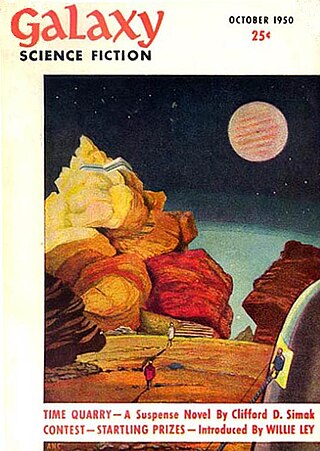
Galaxy Science Fiction was an American digest-size science fiction magazine, published in Boston from 1950 to 1980. It was founded by a French-Italian company, World Editions, which was looking to break into the American market. World Editions hired as editor H. L. Gold, who rapidly made Galaxy the leading science fiction magazine of its time, focusing on stories about social issues rather than technology.
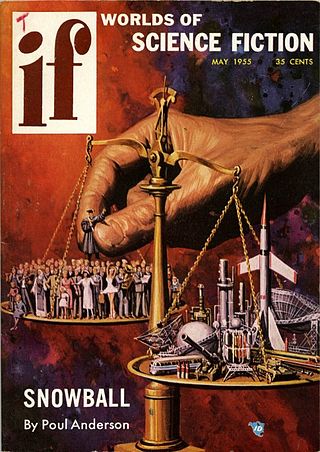
If was an American science fiction magazine launched in March 1952 by Quinn Publications, owned by James L. Quinn.
Edward Groff Conklin was an American science fiction anthologist. He edited 40 anthologies of science fiction, one of mystery stories, wrote books on home improvement and was a freelance writer on scientific subjects as well as a published poet. From 1950 to 1955, he was the book critic for Galaxy Science Fiction.
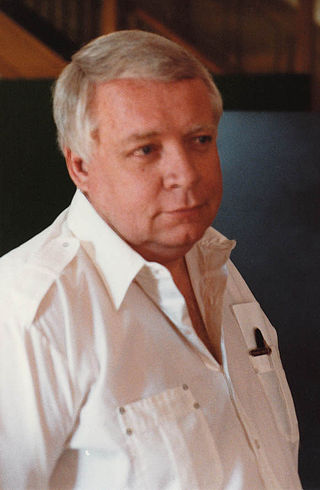
Algirdas Jonas "Algis" Budrys was a Lithuanian-American science fiction author, editor, and critic. He was also known under the pen names Frank Mason, Alger Rome, John A. Sentry, William Scarff, and Paul Janvier. He is known for the influential 1960 novel Rogue Moon.

Robert Sheckley was an American writer. First published in the science-fiction magazines of the 1950s, his many quick-witted stories and novels were famously unpredictable, absurdist, and broadly comical.
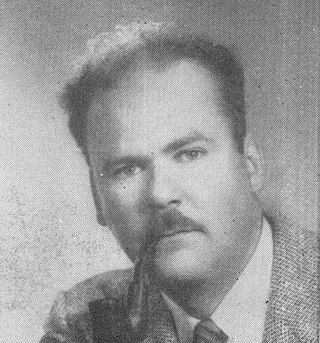
Dallas McCord "Mack" Reynolds was an American science fiction writer. His pen names included Dallas Ross, Mark Mallory, Clark Collins, Dallas Rose, Guy McCord, Maxine Reynolds, Bob Belmont, and Todd Harding. His work focused on socioeconomic speculation, usually expressed in thought-provoking explorations of utopian societies from a radical, sometime satiric perspective. He was a popular author from the 1950s to the 1970s, especially with readers of science fiction and fantasy magazines.

George Oliver Smith was an American science fiction author. He is not to be confused with George H. Smith, another American science fiction author.

Daniel Francis Galouye was an American science fiction writer. During the 1950s and 1960s, he contributed novelettes and short stories to various digest size science fiction magazines, sometimes writing under the pseudonym Louis G. Daniels.
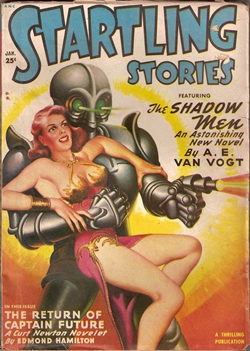
Startling Stories was an American pulp science fiction magazine, published from 1939 to 1955 by publisher Ned Pines' Standard Magazines. It was initially edited by Mort Weisinger, who was also the editor of Thrilling Wonder Stories, Standard's other science fiction title. Startling ran a lead novel in every issue; the first was The Black Flame by Stanley G. Weinbaum. When Standard Magazines acquired Thrilling Wonder in 1936, it also gained the rights to stories published in that magazine's predecessor, Wonder Stories, and selections from this early material were reprinted in Startling as "Hall of Fame" stories. Under Weisinger the magazine focused on younger readers and, when Weisinger was replaced by Oscar J. Friend in 1941, the magazine became even more juvenile in focus, with clichéd cover art and letters answered by a "Sergeant Saturn". Friend was replaced by Sam Merwin Jr. in 1945, and Merwin was able to improve the quality of the fiction substantially, publishing Arthur C. Clarke's Against the Fall of Night, and several other well-received stories.

Robert Abernathy was an American science fiction author during the 1940s and 1950s. He was known primarily for his short stories which were published in many of the pulp magazines that flourished during the Golden Age of Science Fiction. Many of his stories have been included in anthologies of classic science fiction such as the French Les Vingt Meilleurs Récits de science-fiction edited by Hubert Juin.
Galaxy novels, sometimes titled Galaxy Science Fiction Novels, were a series of mostly reprint American science fiction novels published between 1950 and 1961.
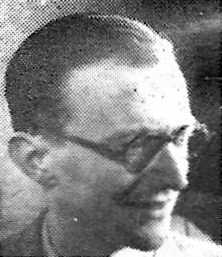
James Murdoch MacGregor was a Scottish journalist and author best known for writing science fiction under the pen name J.T. McIntosh.

The Tritonian Ring and Other Pusadian Tales is a 1953 collection of stories by American science fiction and fantasy author L. Sprague de Camp, first published in hardcover by Twayne Publishers. An E-book edition was published as The Tritonian Ring and Other Pasudian [sic] Tales by Gollancz's SF Gateway imprint on September 29, 2011 as part of a general release of de Camp's works in electronic form. The pieces were originally published between 1951 and 1953 in the magazines and anthologies Two Complete Science Adventure Books, Fantasy Fiction, Imagination Stories of Science and Fantasy, and Fantastic Adventures. The title story, the novel The Tritonian Ring has also been published separately.

William Frederick Temple was a British science fiction writer, best known for authoring the novel-turned-film Four Sided Triangle.

Beyond Fantasy Fiction was a US fantasy fiction magazine edited by H. L. Gold, with only ten issues published from 1953 to 1955. The last two issues carried the cover title of Beyond Fiction, but the publication's name for copyright purposes remained as before.

Jack Banham Coggins was an illustrator, author and artist, who is best known in the United States for his oil paintings of predominantly marine subjects and for his books on space travel.

Imaginative Tales was an American fantasy and science fiction magazine launched in September 1954 by William Hamling's Greenleaf Publishing Company. It was created as a sister magazine to Imagination, which Hamling had acquired from Raymond A. Palmer's Clark Publishing. Imaginative Tales began as a vehicle for novel-length humorous fantasy, early issues featuring stories by Charles F. Myers and Robert Bloch. After a year, Hamling switched the focus to science fiction and it became similar in content to Imagination, publishing routine space operas. In 1958, with public interest in space high, Hamling changed the title to Space Travel, but there was little effect on sales. Magazine circulation was suffering because of the rise of the paperback, and the liquidation in 1957 of American News Company, a major magazine distributor, made it even harder for small magazines to survive. Hamling eventually ceased publication of both Imaginative Tales and Imagination in 1958, preferring to invest the money in Rogue, a men's magazine he had started in imitation of Playboy in 1955.
This article presents an incomplete list of short stories by Robert Sheckley, arranged alphabetically by title.
This is an incomplete list of works by American space opera and science fiction author Frederik Pohl, including co-authored works.
















